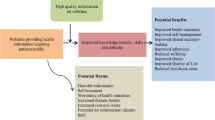Abstract
The internet offers an accessible and cost-effective way to help women suffering with various types of postnatal mental illness and also can provide resources for healthcare professionals. Many websites on postnatal mental illness are available, but there is little information on the range or quality of information and resources offered. The current study therefore aimed to review postnatal health websites and evaluate their quality on a variety of dimensions. A systematic review of postnatal health websites was conducted. Searches were carried out on four search engines (Google, Yahoo, Ask Jeeves and Bing) which are used by 98% of web users. The first 25 websites found for each key word and their hyperlinks were assessed for inclusion in the review. Websites had to be exclusively dedicated to postnatal mental health or have substantial information on postnatal mental illness. Eligible websites (n = 114) were evaluated for accuracy of information, available resources and quality. Results showed that information was largely incomplete and difficult to read; available help was limited and website quality was variable. The top five postnatal mental illness websites were identified for (1) postnatal mental illness sufferers and (2) healthcare professionals. It is hoped these top websites can be used by healthcare professionals both for their own information and to advise patients on quality online resources.


Similar content being viewed by others
References
Alcorn K, O'Donovan A, Patrick J, Creedy D, Devilly G (2010) A prospective longitudinal study of the prevalence of post-traumatic stress disorder resulting from childbirth events. Psychol Med 11:1–11
American Psychiatric Association (2000) Diagnostic and Statistical Manual of Mental Disorders, Fourth Edition, Text Revision: DSM-IV-TR. American Psychiatric Association, Washington, DC
Andersson G, Cuijpers P (2008) Pros and cons of online cognitive-behavioural therapy. Br J Psychiatry 193:270–271
Atkinson NL, Saperstein SL, Pleis J (2009) Using the internet for health-related activities: findings from a national probability sample. J of Med Internet Res 11:1
Baker CD, Kamke H, O'Hara MW, Stuart S (2009a) Web-based training for implementing evidence-based management of postpartum depression. J Am Board Fam Med 22(5):588–589
Baker CD, Kamke H, O'Hara MW, Stuart S (2009) STEP PPD. Available at http://www.step-ppd.com. Accessed Oct 2009
Barak A, Hen L, Boniel-Nissim M, Shapira N (2008) A comprehensive review and a meta-analysis of the effectiveness of internet-based psychotherapeutic interventions. J Technol Hum Services 26(2–4):109–160
Benigeri M, Pluye P (2003) Shortcomings of health information on the internet. Health Promot Int 18(4):381–386
Berland G, Elliott M, Morales L (2001) Health information on the internet: accessibility, quality, and readability in English and Spanish. JAMA 285(20):2612–2621
Brockington IF (2004) Postpartum psychiatric disorders. Lancet 363:303–310
Burke L (2003) The impact of maternal depression on familial relationships. Int Rev Psychiatry 15(3):243–255
Christensen H, Griffiths KM (2004) Delivering interventions for depression by using the internet: randomised controlled trial. Br Med J 328:265–268
Comerford Freda M (2004) Issues in patient education. J Midwifery Womens Health 49(3):203–209
SEO Consultants Directory (2009) Top 10 search engines. Available at http://www.seoconsultants.com/search-engines/. Accessed 23 Oct 2009
Czarnoka J, Slade P (2000) Prevalence and predictors of post-traumatic stress symptoms following childbirth. Br J Clin Psychol 39:35–51
Daniels M (2010) Random number generator. Available at http://www.psychicscience.org/random.aspx. Accessed 28 Apr 2010
Dennis CL, Chung-Lee L (2006) Postpartum depression help-seeking barriers and maternal treatment preferences: a qualitative systematic review. Birth 33(4):323–331
Flesch (2007) Flesch–Kincaid reading scale. Flesh 2.0 for Windows [software]. Available at http://flesh.sourceforge.net/. Accessed 19 Apr 2010
Glasheen C, Richardson GA, Fabio A (2009) A systematic review of the effects of postnatal anxiety on children. Arch Womens Ment Health 13(1):61–74
Griffiths KM, Christensen H (2000) Quality of web based information on treatment of depression: cross sectional survey. Br Med J 321:1511–1515
Griffiths KM, Christensen H (2006) The quality and accessibility of Australian depression sites on the world wide web. Med J Aust 176:S97–S104
Griffiths K.M, Calear CL, Banfield M, Tam A (2009) Systematic review on internet support groups (ISGs) and depression: what is known about depression ISGs? J Med Internet Res 11(3): 1–13. Available at http://www.jmir.org/2009/3/e41/. Accessed 10 Feb 2010
Heringhausen J, Montgomery KS (2002) Websites that address postpartum depression. J Perinat Educ 11(3):48–50
Kapoun J (1998) Teaching undergrads WEB evaluation: a guide for library instruction. C&RL News (July/August 1998):522–523
Matthey S, Barnett B, Howie P, Kavanagh DJ (2003) Diagnosing postpartum depression in mothers and fathers: whatever happened to anxiety? J Affective Disord 74(2):139–147
McCarthy M, McMahon C (2008) Acceptance and experience of treatment for postnatal depression in a community mental health setting. Health Care Women Int 29(6):618–637
Reissland N, Shepherd J (2006) The effect of maternal depressed mood on infant emotional reaction in a surprise-eliciting situation. Infant Ment Health J 27(2):173–187
Shakespeare J, Blake F, Garcia J (2003) A qualitative study of the acceptability of routine screening of postnatal women using the Edinburgh Postnatal Depression Scale. Br J Gen Pract 53(493):614–619
Summers AL, Logsdon MC (2005) Web sites for postpartum depression. MCN Am J Matern Child Nurs 30(2):88–96
WHO (1993) The ICD-10 Classification of mental and behavioural disorders diagnostic criteria for research. WHO, Geneva
Wisner KL, Parry BL, Piontek CM (2002) Clinical practice: postpartum depression. N Engl J Med 347:194–199
Acknowledgements
We would like to thank Rose Meades for her time as an additional website reviewer and Dr Richard de Visser for his advice.
Conflict of interest
The authors declare that they have no conflict of interest.
Author information
Authors and Affiliations
Corresponding author
Appendix
Appendix
Rights and permissions
About this article
Cite this article
Moore, D., Ayers, S. A review of postnatal mental health websites: help for healthcare professionals and patients. Arch Womens Ment Health 14, 443–452 (2011). https://doi.org/10.1007/s00737-011-0245-z
Received:
Accepted:
Published:
Issue Date:
DOI: https://doi.org/10.1007/s00737-011-0245-z




